

How To Tackle Digital Citizenship During The First 5 Days Of School. Digital citizenship is not a one time discussion.
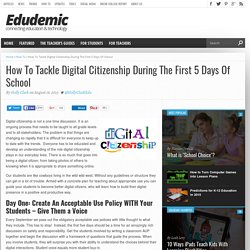
It is an ongoing process that needs to be taught to all grade levels and to all stakeholders. The problem is that things are changing so rapidly that it is difficult for everyone to keep up to date with the trends. Everyone has to be educated and develop an understanding of the role digital citizenship plays in our everyday lives. There is so much that goes into being a digital citizen; from taking photos of others to knowing when it is appropriate to share something online.
Our students are like cowboys living in the wild wild west. Day One: Create An Acceptable Use Policy WITH Your Students – Give Them a Voice Every September we pass out the obligatory acceptable use policies with little thought to what they include. For this discussion, think about digital citizenship in general, at school, at home and in transit.
Who is responsible for the technology or the device – what does that entail? Day Two:Discuss “Online Privacy” 10 Important Things for Students to Be Good Digital CIitizens. Online netiquette, digital citizenship, and good digital manners are all components of the same internet safety kit every student and teacher should know about.
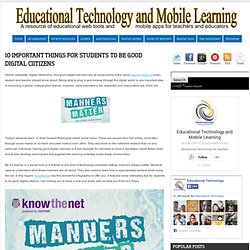
Being able to plug in and browse through the digital world is one important step in becoming a global, independent learner, however, more important is the respectful and responsible use of the net. Today's students learn in what Howard Rheingold called social mobs. These are people who met online, most often through social media, to co-learn and peer instruct each other. They rely more on the collective wisdom than on any particular individual. Having good digital manners is a pre-requisite for members to build a reputation inside these mobs and to also develop learning ties that augment the learning potential inside these communities. 20 Basic Rules For Digital Citizenship.
The definition of digital citizenship has to do with the quality of behaviors that impact the quality of digital content and communities.
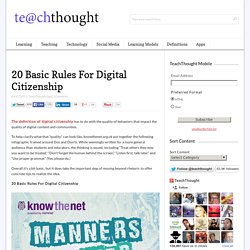
To help clarify what that “quality” can look like, knowthenet.org.uk put together the following infographic framed around Dos and Don’ts. While seemingly written for a more general audience than students and educators, the thinking is sound, including “Treat others they way you want to be treated,” “Don’t forget the human behind the screen,” “Listen first, talk later,” and “Use proper grammar.” (Yes, please do.) Overall it’s a bit basic, but it does take the important step of moving beyond rhetoric to offer concrete tips to realize the idea.
Hot Topics. Most children enter kindergarten as technology users, but their knowledge of how to use it safely and appropriately varies as widely as their abilities to print their names and tie their shoes.
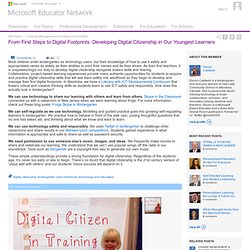
As their first teachers, it is unquestioningly our duty to develop digital citizenship alongside scissor skills and sharing. Collaborative, project-based learning experiences provide many authentic opportunities for students to acquire and practice digital citizenship skills that will see them safely into adulthood as they begin to develop and manage their first digital footprints. In Manitoba, we have a Literacy with ICT Developmental Continuum that fosters critical and creative thinking skills as students learn to use ICT safely and responsibly. How does this actually look in kindergarten? Be a Digital Citizen. PD Anytime -10 Education Podcasts from EdReach. Podcasts are free, easy ways for teachers, and anyone interested in the education field to share ideas, learning and news.
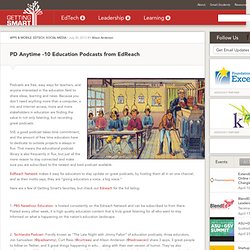
Because you don’t need anything more than a computer, a mic and internet access, more and more stakeholders in education are finding the value in not only listening, but recording great podcasts. Still, a good podcast takes time commitment, and the amount of free time educators have to dedicate to outside projects is always in flux. That means the educational podcast library is also frequently in flux, but just all the more reason to stay connected and make sure you are subscribed to the newest and best podcast available.
EdReach Network makes it easy for educators to stay update on great podcasts, by hosting them all in on one channel, and as their motto says, they are “giving educators a voice, a big voice.” Here are a few of Getting Smart’s favorites, but check out Edreach for the full listing: 1. 2. 3. 4. 5. 6. 8.